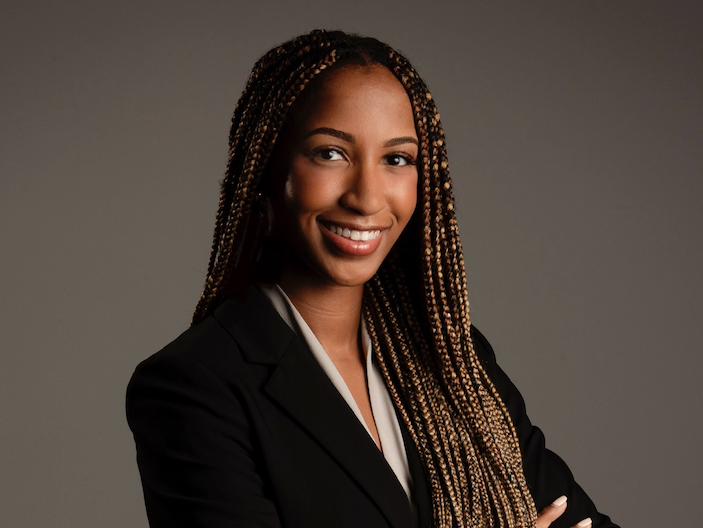Three Moody College alumni receive 2025 Pulitzer Prizes
Moody College of Communication alumni Cassandra Jaramillo, Brianna Tucker and Lisa Falkenberg were awarded Pulitzer Prizes for covering impactful news stories and history-making breaking news.
Jaramillo, and her colleagues at ProPublica, received the Pulitzer in the Public Service category. Their storytelling focused on pregnant women who died after doctors delayed urgently needed care for fear of violating vague “life of the mother” exceptions in states with strict abortion laws.
Jaramillo graduated from Moody College in 2016.
“As a UT Journalism student, I took reporting classes and joined student media in my first year,” she said. “I learned what it takes to be a reporter—both in the classroom, thanks to excellent professors, and in the field, producing stories for Texas Student Television and later The Daily Texan.”
Jaramillo says that the most memorable and challenging class that she took during her time at UT was Reporting Words, an introduction to reporting that included covering public meetings and writing feature stories. She says that she didn’t know how to write an article until that class.
“I was especially grateful for Professor Robert Quigley, who supported me when I struggled with an assignment,” Jaramillo said. “I told him I wanted to become a reporter, even though I had no experience and came from a family without a college background. His support meant a lot.”
Jaramillo says that it’s surreal to have received such a prestigious honor and hopes that current and future journalism students at Moody College never underestimate themselves.
“Follow your passion—whether it’s writing, reporting, social media, or television,” she said. “I came to UT as a first-generation immigrant and felt deep imposter syndrome. But reporting unlocked a passion I didn’t know I had. It came naturally, and I loved it.”

Tucker, alongside the staff of The Washington Post, were awarded the Pulitzer for Breaking News Reporting for their coverage and analysis of the July 13, 2024 attempt to assassinate then-presidential candidate Donald Trump.
“It was expected to be a typical weekend campaign rally,” Tucker said. “I was the deputy campaign editor on duty monitoring the rally from D.C. when those shots were fired.”
She said the team’s first, and most important, action was to ensure that their lead reporter at the scene was safe.
“What followed was an all-hands-on-deck effort, beyond just myself, and collaboration from the rest of the campaign team, photographers, senior editors, visuals and forensics team, copy editors, and so many more of our impressive colleagues — all of whom, without hesitation, did amazing work to cover this competitive story.”
Tucker, who also graduated from Moody College in 2016, said that during her time at the University of Texas there was always news or a story to discover, ample opportunity to learn from the best and expand her view on the world.
She says Kate Winkler Dawson (whom she affectionately calls K-Dawg), Robert Quigley and Leonard Moore are three professors that left a lasting impression.
“I learned immensely from Dawson about the foundations of broadcast writing,” Tucker said. “And though I haven’t worked in broadcast news, I still rely on her expertise in storytelling for a variety of formats. She also embodied the traits of every great journalist and teacher: empathy, patience, and curiosity.”
Tucker said that being awarded the Pulitzer was deeply gratifying.
“Covering the campaign was the most difficult job I’ve ever had, with long hours, very late nights, time away from family and a nonstop news cycle,” she said. “It validated every sacrifice this team made in the 2024 cycle and the unique experiences, skills and news instinct my colleagues bring to work every day.”
Tucker says that it’s important that aspiring journalists trust themselves and to speak up.
“Don’t just tell readers what happened, show them,” she said. “You can be a good journalist and care about your community. And remember to pace yourself if possible – we often let our commitment to our profession and impact supersede the reality that journalism is what we do, not all that we are.”

Falkenberg, along with a team of writers at the Houston Chronicle, were awarded the Pulitzer Prize in Editorial Writing. Their series covered dangerous train crossings that put people and communities at risk while also demanding action and change from local leaders.
This is Falkenberg’s third Pulitzer. That number is only matched by two other famed writers, Edward Albee and Carl Sandburg.
Born and raised in Seguin, Texas, Falkenberg was the first member of her family to go to college. She became a columnist for the Houston Chronicle in 2005. She won her first Pulitzer Prize in 2015 for a series of stories that uncovered a wrongful conviction in a death penalty case. The second came in 2022, awarded to The Chronicle’s editorial team for a series of stories examining voter fraud in Texas during the 2020 elections.
Falkenberg told Houston’s ABC 13 that as a reporter you must write the stories that are important to people’s lives. She continued by saying that it was really the first Pulitzer that changed her life.
Having grown up in a small town, it wasn’t a given that she’d even continue her education after high school. She told ABC 13 that she only applied to one school, the University of Texas, and that she’s still grateful to have ever been accepted.
While winning three Pulitzers is undoubtably impressive, she says that her daughter still isn’t convinced, adding that she insists her mother isn’t a real writer until she writes a book.
“Some people you just can’t impress.”
